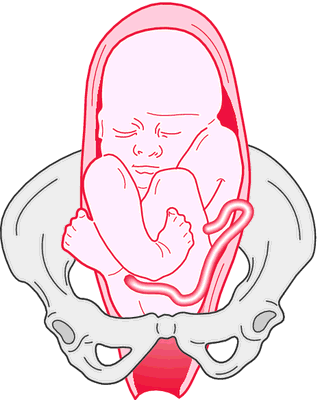presentation
[prez″en-ta´shun]that part of the fetus lying over the pelvic inlet; the presenting body part of the fetus. See also position and lie.
breech presentation presentation of the fetal buttocks, knees, or feet in labor; the feet may be alongside the buttocks (complete breech presentation); the legs may be extended against the trunk and the feet lying against the face (frank breech presentation); or one or both feet or knees may be prolapsed into the maternal vagina (incomplete breech presentation).

Breech presentation. From McKinney et al., 2000.
antigen presentation presentation of ingested antigens on the surface of macrophages near histocompatibility antigens; see also antigen presentation.
cephalic presentation presentation of any part of the fetal head in labor, whether the vertex, face, or brow.
compound presentation prolapse of one of the limbs of the fetus alongside the head in cephalic presentation or of one or both arms alongside a presenting breech at the beginning of labor.
footling presentation presentation of the fetus with one foot (single footling) or two feet (double footling) prolapsed into the maternal vagina.
funic presentation presentation of the umbilical cord in labor.
placental presentation placenta praevia.
shoulder presentation presentation with the fetal shoulder as the presenting part; see oblique lie and transverse lie.
transverse presentation transverse lie.
Miller-Keane Encyclopedia and Dictionary of Medicine, Nursing, and Allied Health, Seventh Edition. © 2003 by Saunders, an imprint of Elsevier, Inc. All rights reserved.
pre·sen·ta·tion
(prē'zen-tā'shŭn, prez-),That part of the fetus presenting at the superior aperture of the maternal pelvis; occiput, chin, and sacrum are, respectively, the determining points in vertex, face, and breech presentation.
See also: position (3). See also entries under position
See also: position (3). See also entries under position
[see present]
Farlex Partner Medical Dictionary © Farlex 2012
presentation
(prĕz′ən-tā′shən, prē′zən-)n.
Medicine
a. The position of the fetus in the uterus at birth with respect to the mouth of the uterus.
b. A symptom or sign or a group of symptoms or signs that is evident during a medical examination: The patient's presentation was consistent with a viral illness.
c. The fact of being evident or manifest. Used of a disease or condition: the presentation of thyroid disease during pregnancy.
pres′en·ta′tion·al adj.
The American Heritage® Medical Dictionary Copyright © 2007, 2004 by Houghton Mifflin Company. Published by Houghton Mifflin Company. All rights reserved.
presentation
Clinical medicine The manner in which a Pt appears to his/her caregivers, generally at the time of initial examination. See Clinical presentation Obstetrics The manner in which an infant presents in the birth canal. See Breech presentation, Brow presentation, Cephalic presentation, Face presentation, Footling breech presentation.McGraw-Hill Concise Dictionary of Modern Medicine. © 2002 by The McGraw-Hill Companies, Inc.
pre·sen·ta·tion
(prez'ĕn-tā'shŭn)That part of the fetus presenting at the superior aperture of the maternal pelvis; occiput, chin, and sacrum are, respectively, the determining points in vertex, face, and breech presentation.
See also: position (3) , present
See also: position (3) , present
Medical Dictionary for the Health Professions and Nursing © Farlex 2012
Patient discussion about presentation
Q. What are the presenting signs of ALS? Are the upper or lower extremeties affected initialilly?
A. The most common presenting sign of ALS is asymmetric limb weakness, usually starting with the hands (problems with pinching, writing, holding things etc.) shoulders (lifting arms above head etc.) or legs (problems walking).
Other presenting signs may be problems with speaking or swallowing, although these are less common.
You may read more here:
www.nlm.nih.gov/medlineplus/amyotrophiclateralsclerosis.html
Other presenting signs may be problems with speaking or swallowing, although these are less common.
You may read more here:
www.nlm.nih.gov/medlineplus/amyotrophiclateralsclerosis.html
Q. Iam a bipolar and presently on tegretol medication.I found this to be the best way to get my doubt clarified. I am a bipolar and presently on tegretol medication. My doctor frequently changes the meds and he has tried variety of medicines before prescribing tegretol. He changes the meds every time when I visit him for routine check-up. I am bit confused and obviously cannot question my doctor as I repose faith and confidence in him. I found this to be the best way to get my doubt clarified.
A. Are you being treated by your GP? I would suggest if you are having trouble finding the right combinations it might be a good time to ask to be referred to a Psychaitrist. GP's will do their best but like anything specialized they only have a certain amount of knowledge and a specialist in the field could be more help. I also think that other treatments along with The medications like theropy and group theropy, excercise, good diet, plenty of sleep etc helps a lot too... Try to be patient it is a process to get everything in place that will work the best for you... everyone is different and the .mmedications and treatments that work for one may not work for another...
More discussions about presentationThis content is provided by iMedix and is subject to iMedix Terms. The Questions and Answers are not endorsed or recommended and are made available by patients, not doctors.